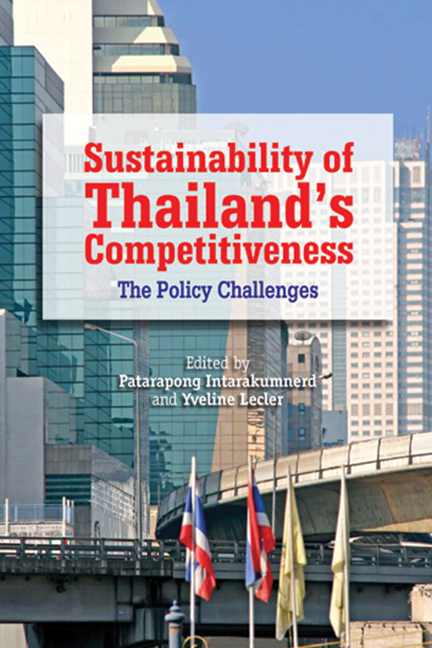Introduction
Published online by Cambridge University Press: 21 October 2015
Summary
The competitiveness of a country is not a given that lasts forever. Staying competitive requires continuous upgrading and, sometimes, even major transformation. Factors that used to underpin competitiveness in the past might turn to be ones reducing competitiveness in the future. Therefore, the ability of a country to learn to create new factors is very important for it to maintain its position in global competition. Thailand, which was once successful in catching up and competing with others, is now facing problems in maintaining its position and upgrading to the next stage of development.
COMPETITIVENESS, A KNOWLEDGE-BASED AND LEARNING ECONOMY, AND THE SIGNIFICANT ROLES OF INSTITUTIONS
A country's competitiveness and ability to catch up rely very much on its embedded “national” characteristics or so-called “national innovation system” or NIS. The roots of innovation systems (IS) concepts are based on Schumpeterian economics, which emphasize innovation and entrepreneurship, combined with the essence of Charles Darwin's evolutionary theory. The emergence of NIS concepts, particularly in industrialized countries in the northern hemisphere, can be traced back to the work of Lundvall (1988, 1992) on national systems of innovation or national policies of innovation, and other works (see Freeman 1987; Nelson 1988) started in the mid-1980s. NIS is an interactive system involving existing “institutions”, private and public firms (either large or small), universities and government agencies, which aimed at the production of science and technology within national borders. Interaction among these units may be technical, commercial, legal, social, and financial, and the goal of the interaction may be development, protection, financing, or regulation of new science and technology (Niosi et al. 1993).
Institutions should be understood as encompassing “the basic rules of the game”, the broad legal regime and the way it is enforced, widely held norms that constrain behaviour, and so on (North 1990).
- Type
- Chapter
- Information
- Sustainability of Thailand's CompetitivenessThe Policy Challenges, pp. 1 - 14Publisher: ISEAS–Yusof Ishak InstitutePrint publication year: 2010

